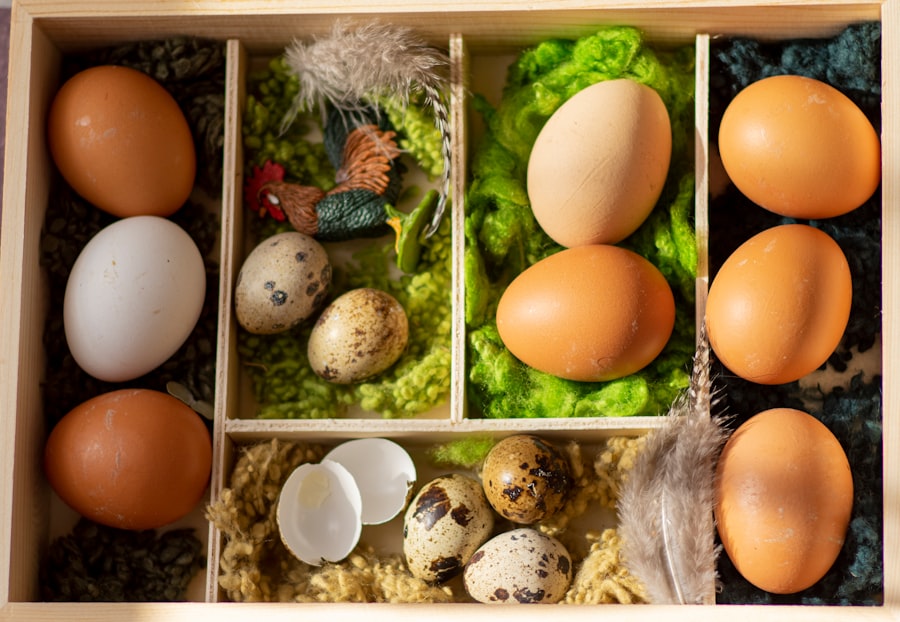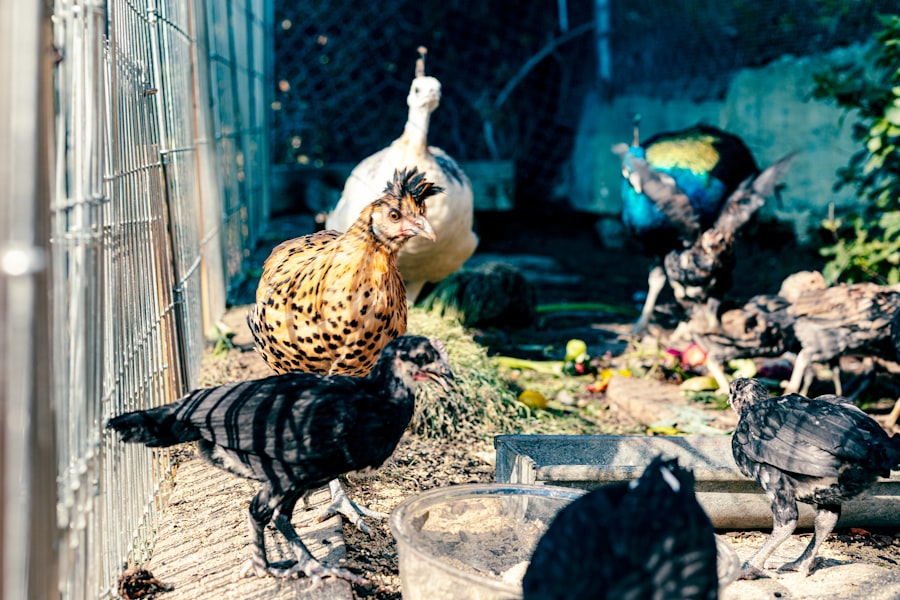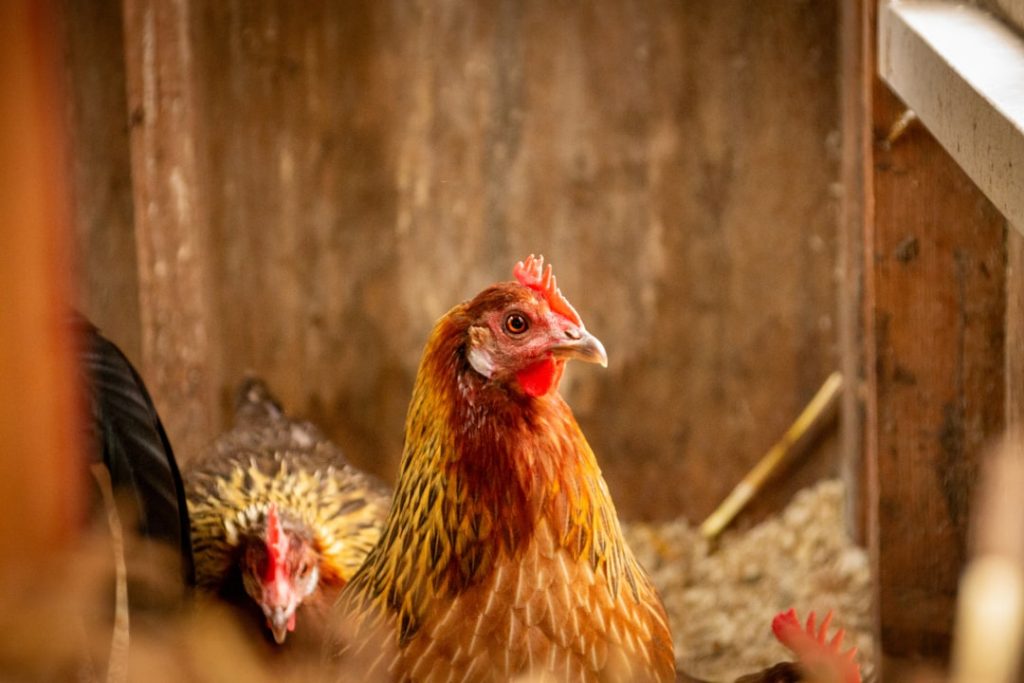Chickens are social creatures with a complex flock structure, including a hierarchical pecking order that determines each bird’s social status. Understanding this behavior is essential for maintaining a harmonious flock environment. Chickens exhibit diverse personalities, ranging from shy to assertive.
Careful observation of their body language and vocalizations can provide insight into their needs and emotional states. Natural instincts play a crucial role in chicken behavior, including foraging, dust bathing, and roosting. Providing opportunities for these activities is vital for their well-being.
Chickens instinctively scratch and peck at the ground in search of insects and seeds, making a spacious outdoor area important for foraging. Access to dust bathing areas is necessary for feather maintenance and parasite control. Accommodating these natural behaviors promotes the overall health and happiness of chickens.
Table of Contents
Key Takeaways
- Chickens have a complex social structure and exhibit various behaviors such as pecking order, dust bathing, and foraging.
- Providing ample space for chickens to roam and explore is crucial for their physical and mental well-being.
- When introducing new chickens to an existing flock, it’s important to do so gradually and in a neutral territory to minimize aggression.
- Having multiple feeding and watering stations can help reduce competition and aggression among chickens.
- Implementing distractions and enrichment activities such as hanging treats or providing toys can help reduce boredom and aggressive behavior in chickens.
- Regularly monitoring chicken behavior and addressing any signs of aggression or stress is essential for maintaining a harmonious flock.
- Seeking professional advice from a veterinarian or experienced poultry keeper can provide valuable insights and guidance for managing chicken behavior and aggression.
Creating a Spacious Environment
Space for Physical and Mental Well-being
Providing a spacious environment for your chickens is crucial for their physical and mental well-being. Chickens need ample space to move around, stretch their wings, and engage in natural behaviors like foraging and dust bathing. Overcrowding can lead to stress, aggression, and health problems, so it’s essential to provide sufficient space for your flock.
A Safe and Secure Environment
In addition to space, it’s vital to provide a safe and secure environment for your chickens. This means ensuring that the coop is predator-proof and that the outdoor run is enclosed with sturdy fencing. A secure environment will help your chickens feel protected and reduce the risk of predator attacks.
Shelter from the Elements
Providing shelter from the elements is also crucial for your chickens’ well-being. This includes providing shade from the sun, protection from wind and rain, and ensuring that the coop and outdoor run are well-ventilated. By creating a spacious, secure, and sheltered environment, you can help promote your chickens’ overall health and happiness.
Introducing New Chickens Carefully

Introducing new chickens to an existing flock can be a delicate process, as it can disrupt the established pecking order and lead to aggression and stress. It’s important to introduce new chickens carefully and gradually to minimize conflict and ensure a smooth transition. One method is to keep the new chickens separate from the existing flock for a period of time, allowing them to see and smell each other without direct contact.
This can help the chickens become familiar with each other before they are introduced. When it’s time to introduce the new chickens to the existing flock, it’s best to do so during the evening when the chickens are roosting. This can help reduce aggression, as the chickens will be less likely to engage in territorial disputes during this time.
It’s also helpful to provide multiple food and water sources to prevent competition and ensure that all chickens have access to essential resources. By introducing new chickens carefully and thoughtfully, you can help minimize stress and conflict within your flock.
Providing Multiple Food and Water Sources
Providing multiple food and water sources is essential for ensuring that all chickens have access to essential resources and preventing competition and aggression. Chickens can be territorial when it comes to food and water, so having multiple feeding and watering stations can help reduce conflict within the flock. It’s important to place these stations in different areas of the coop or outdoor run to ensure that all chickens have easy access.
In addition to providing multiple food and water sources, it’s important to offer a balanced diet that meets the nutritional needs of your chickens. This includes a high-quality commercial feed, as well as access to fresh fruits, vegetables, and grains. Providing calcium supplements, such as crushed oyster shells, is also important for egg-laying hens.
By providing multiple food and water sources and ensuring a balanced diet, you can help promote the health and well-being of your flock.
Implementing Distractions and Enrichment
Chickens are intelligent animals that benefit from mental stimulation and enrichment. Implementing distractions and enrichment activities can help prevent boredom and reduce stress within the flock. For example, hanging a cabbage or other treat from a string can provide entertainment and encourage natural foraging behaviors.
Providing perches, roosts, and other structures within the coop can also give chickens opportunities for exercise and exploration. In addition to physical enrichment, it’s important to provide mental stimulation for your chickens. This can include providing novel objects or toys for them to investigate, as well as opportunities for social interaction with other chickens.
By implementing distractions and enrichment activities, you can help keep your chickens engaged and content, which will contribute to their overall well-being.
Monitoring and Addressing Aggressive Behavior

Identifying the Root Cause of Aggression
One method for addressing aggressive behavior is to identify the root cause of the aggression. This could be related to overcrowding, inadequate resources, or the introduction of new chickens. By addressing the underlying cause, you can help reduce conflict within the flock.
Separating Aggressive Chickens
Separating aggressive chickens from the rest of the flock temporarily can also help reduce tension and give them a chance to calm down.
Seeking Professional Advice
Seeking professional advice from a veterinarian or experienced poultry keeper may also be necessary if aggressive behavior persists despite your efforts.
Seeking Professional Advice
If you’re experiencing challenges with managing your chicken flock or addressing behavioral issues, seeking professional advice is essential. A veterinarian with experience in poultry health and behavior can provide valuable insights and guidance for promoting the well-being of your chickens. They can help diagnose and treat health issues, as well as provide recommendations for managing aggressive behavior or introducing new chickens.
In addition to veterinary support, seeking advice from experienced poultry keepers or joining a local poultry club or community can provide valuable support and resources. Connecting with others who have experience in raising chickens can offer practical tips and strategies for managing your flock effectively. By seeking professional advice and connecting with other poultry enthusiasts, you can gain valuable knowledge and support for promoting the health and well-being of your chickens.
In conclusion, understanding chicken behavior and providing a spacious environment are essential for promoting the well-being of your flock. Introducing new chickens carefully, providing multiple food and water sources, implementing distractions and enrichment activities, monitoring and addressing aggressive behavior, and seeking professional advice are all important strategies for managing a healthy and harmonious chicken flock. By implementing these strategies thoughtfully and consistently, you can create an environment where your chickens can thrive physically, mentally, and socially.
If you’re looking for ways to prevent bullying among your chickens, you may want to check out this article on 10 Tips for Creating a Happy Chicken Coop. Creating a comfortable and spacious environment for your chickens can help reduce stress and minimize aggressive behavior.
FAQs
What is chicken bullying?
Chicken bullying refers to aggressive behavior among chickens, where one or more chickens peck, chase, or otherwise intimidate another chicken within the flock.
Why do chickens bully each other?
Chickens may bully each other due to a variety of reasons, including establishing a pecking order, competition for resources such as food and water, overcrowding, or stress.
What are the effects of chicken bullying?
Chicken bullying can lead to physical injuries, stress, decreased egg production, and even death in extreme cases. It can also disrupt the overall harmony and productivity of the flock.
How can you prevent chicken bullying?
To prevent chicken bullying, provide adequate space for the chickens, ensure a balanced diet with enough food and water for all, and minimize stress factors such as overcrowding and sudden changes in the environment. Additionally, introducing new chickens to the flock gradually can help reduce aggression.
What can be done if bullying behavior is observed in chickens?
If bullying behavior is observed in chickens, it is important to separate the bullied chicken from the aggressors to prevent further harm. Additionally, providing distractions such as hanging treats or toys can help redirect the chickens’ attention and reduce aggression.
Meet Walter, the feathered-friend fanatic of Florida! Nestled in the sunshine state, Walter struts through life with his feathered companions, clucking his way to happiness. With a coop that’s fancier than a five-star hotel, he’s the Don Juan of the chicken world. When he’s not teaching his hens to do the cha-cha, you’ll find him in a heated debate with his prized rooster, Sir Clucks-a-Lot. Walter’s poultry passion is no yolk; he’s the sunny-side-up guy you never knew you needed in your flock of friends!







